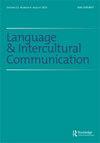Implications of past and present equivocations in reproducing or challenging epistemic violence in encounters with difference
IF 2.2
1区 文学
0 LANGUAGE & LINGUISTICS
引用次数: 0
Abstract
Based on an ethnographic research study, in an Ecuadorian Amazonian Kichwa territory, I use the notion of ‘translation as controlled equivocation’ as an analytical tool to explore the making sense of difference. Occurring in the same territory, I analyse these encounters with difference, read in relation to a classroom dialogue between teacher and students, with that of a historical encounter with the ‘other’ in a Dominican missionary’s diary of 1887/1888. I propose that exploring the processes of equivocation centring differing subjective positions and situated dialogues, provides a reflective tool against reproducing epistemic violence whilst making space to recognize difference.在遇到差异时再现或挑战认知暴力的过去和现在的模棱两可的含义
基于一项民族志研究,在厄瓜多尔亚马逊地区的Kichwa地区,我使用“翻译作为受控模棱两可”的概念作为分析工具来探索差异的意义。发生在同一地区,我分析这些不同的遭遇,与老师和学生之间的课堂对话有关,与多米尼加传教士1887/1888年日记中与“他者”的历史遭遇有关。我建议探索以不同主观立场和情境对话为中心的模棱两可过程,提供一种反思工具,反对再现认知暴力,同时为认识差异提供空间。
本文章由计算机程序翻译,如有差异,请以英文原文为准。
求助全文
约1分钟内获得全文
求助全文
来源期刊

Language and Intercultural Communication
Multiple-
CiteScore
3.00
自引率
47.40%
发文量
50
期刊介绍:
Language & Intercultural Communication promotes an interdisciplinary understanding of the interplay between language and intercultural communication. It therefore welcomes research into intercultural communication, particularly where it explores the importance of linguistic aspects; and research into language, especially the learning of foreign languages, where it explores the importance of intercultural perspectives. The journal is alert to the implications for education, especially higher education, and for language learning and teaching. It is also receptive to research on the frontiers between languages and cultures, and on the implications of linguistic and intercultural issues for the world of work.
 求助内容:
求助内容: 应助结果提醒方式:
应助结果提醒方式:


